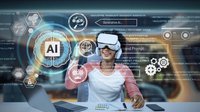“If we look at the life cycle of technologies, we see an early period of over-enthusiasm, then a ‘bust’ when disillusionment sets in, followed by the real revolution.”
— Futurist, Ray Kurzweil.
Ray Kurzweil is a bestselling author, futurist and Director of Engineering for Google. When describing the life cycle of technology development, he talks about over-enthusiasm prior to the real revolution. The development of artificial intelligence (AI) fits this description perfectly. Every developer and his uncle have claimed that their tech is AI. Apple’s SIRI, Amazon’s Alexa, Microsoft’s Cortona and Google’s Hey Google are all thought to be AI. In fact, machine learning and speech recognition are very important parts of AI, but not the holy grail.
In order to be real AI, artificial intelligence must communicate, grow, learn and in essence, think. And the big four are working toward that end. You may wonder, which of these four behemoths will be first to actually bring artificial intelligence to the world. Each company has incredible resources, and each is synonymous with technological innovation.
But none will be the company that will change the world with AI.
THIS IS THE COMPANY
The company that could change the world is a little-known technology company with a rather innocuous sounding name: Value Spring Technology. Without getting overly technical, here’s a brief overview of Value Spring’s AI, called Ali, including what makes its technology so different.
According to my friend Sal Gerardo, chairman of Value Spring, it’s important to understand what is going on with the other AI products. “First, let’s start with other AI conversational products and the technology that supports them. They use machine learning, an arrangement of pre-written scripts and programming, to handle simple requests and answer specific questions. Conversational dialog is limited because the responses are programmed in as specific static phrases. Expanding the knowledge base for more conversation is problematic because you need to increase the static responses and link them to new requests and questions. It gets very complex very quickly; there is no ability to scale for longer dialogue, or more complex questions.”
Here’s how Sal explains Value Spring’s AI solution, Ali.
“Ali is built on a platform called enterpriseMind. It’s a 9-Dimensional Hypercube of neural networks and digital processes that covers all nine dimensions of human meaning, just like the human brain does. enterpriseMind is software that models the way we think. For example, ‘ship,’ Ahab’ and 219,117 other words were used to write the story ‘Moby Dick,’ Herman Melville’s great 19th century novel about revenge. In the entire text, the word ‘revenge’ never appears. However, the human brain works from context to derive meaning from the novel and we understand the book is about revenge.
“The make-up of the human brain allows us to understand the meaning of the novel. In the same way, the 9-dimensional make-up of the enterpriseMind platform gives our AI understanding, or meaning, and has two major benefits: first, it can learn facts automatically at minimal cost and second, it can scale this knowledge into human level functionality. This 9-D functionality gives Ali the ability to handle a wide variety of tasks such as being a conversational tutor to virtually any child, or having the ability for a truly spontaneous conversation as an avatar-based customer service rep. Ali can also perform complex highly manual data processing like data integration/fusion, but at computer speeds and capacities.”
The 9-dimensional meaning engine allows enterpriseMind to understand the meaning of the data it needs to process, not simply to respond with a predetermined script.
Here’s how it works. According to Sal, “It understands meaning by utilizing a knowledge library and grammar which is populated in the computer with the knowledge required for whatever problem is being solved. So, if you have a student who needs responses on space, a space knowledge library is generated. If responses are needed in American History, an American History knowledge library is generated, and so on. Then, when the requests and questions are asked, Ali taps the knowledge contained in the library to generate its own responses to questions. It can then generate its own questions to have real, original conversations on the subject.
“This starts a snowball effect within the learning environment, so as Ali gains more knowledge from interactions with students and other requestors, it gets smarter and can adapt automatically. Because it generates its own dialogue and gets smarter, the questions can get harder and the dialogue can evolve. Ali can also support Socratic teaching dialogue that will ask the student questions to determine if he or she understands the subject and will continually evaluate the progress until mastery is achieved. Ali will continue to evolve to dramatically improve teacher and student productivity and become an essential augmented intelligence capability that can reach students on a global scale.
“The meaning engine allows Ali to understand the meaning of data and Ali can automatically generate its own scripts, programming and dialogue. Once the core enterpriseMind platform is introduced, the Ali educational tutor is designed to work autonomously and will scale on a global footprint to educate millions of students – even the 400 million students in the world that have NO access to education. With additional knowledge libraries, it will achieve a complete unlimited Socratic teaching environment that will assist students and teachers, and progress will be assessed in real time, without the need for testing, in a one-on-one direct teaching environment.”
HERE’S HOW IT WILL CHANGE THE WORLD
AI, through enterpriseMind’s Ali tutor, has the ability to bring quality education to the entire world. Millions of children who currently have no access to quality education, including children right here at home, will soon have access to a modern, effective education. With Ali, true personalization in education will be available to learners across the globe. Learning will be democratized, regardless of country or ability to pay.
Boys and girls, that’s a game changer. Equal access to education is the defining challenge in the world today. Just imagine how the world would change. Imagine the problems we could solve.
In many ways, AI and its delivery is where education has been heading for a long time. The work to modernize education and to take advantage of the available technology is something that schools are just now beginning to understand. What Amazon has done for retailing, what Uber has done for transportation and what FedEx has done for delivery, technology can also do for learners. According to LeiLani Cauthen, CEO of the Learning Counsel and one of the world’s leading experts in the digital transition in education, “What’s driving technology in other sectors is a collective human longing for quality of life through time and distance efficiencies being met by mobile and online technologies. Schools, meanwhile, are still structurally and schedule-wise largely the same despite the pile-on of technology into the classroom. Administrations are locked into an organizational structure and expectation of schedules, testing requirements, buildings and ringing bells, and are primarily utilizing teachers as the center-pin of delivery.”
Even without the use of AI, Cauthen’s group is working to modernize the delivery of knowledge to streamline the learning process and advises education leaders, “If you are an administrator in any school, the way to start thinking is that you are the leader of a digital-first entity now and your physical environment and human staff remain important parts of that service. When your site and software carry the bulk of the delivery load of learning as in other industries, schools can naturally leverage people and places to greater effect and lower cost.”
Just imagine when real AI is part of the equation. Strictly speaking, the need may not be as immediate in the US and other technology-rich countries. We already have consumer-grade courseware that is making its way into schools, complete with video game quality graphics and an incredible immersive experience. Here, it’s more about the organization, workflow and delivery of these products. But even with everything we have going for us, the use of a sophisticated, thinking, 9-Dimensional AI to talk to students, access their level of need and deliver that consumer-grade courseware is very compelling. For the kids that aren’t as lucky as we are and don’t have access to what we have, artificial intelligence in the form of enterpriseMind’s Ali educational tutor could be everything.
The world is changing. In the 1800s, we saw the use of machines create rapid industrialization that changed much of the world from an agrarian society to an industrial one. In the 1900s, we conquered the sky, split the atom and created the Internet. As monumental as all those changes are, they may pale in comparison to the creation of artificial intelligence. In this century, we could witness the eradication of hunger, disease and poverty. We will certainly see the colonization of the solar system and the harnessing of unlimited, globally available power.
Artificial intelligence will make advances in knowledge acquisition possible that are, even now, undreamed of. Advances in technology will no longer be limited to our ability to program computers. Progress will be exponential. For the first time in our history, we could see a globally educated population working together to solve the challenges of humanity.
And it may all be possible, thanks to a little-known company with a rather innocuous-sounding name. You’ll be able to tell your children, and their children. This is where you were when you first read about Ali.
And the rest, as they say, is history.
About the Author
Charles Sosnik is an education journalist and editor, and serves as Editor in Chief at the Learning Counsel.
This article originally appeared on Grit Daily.










